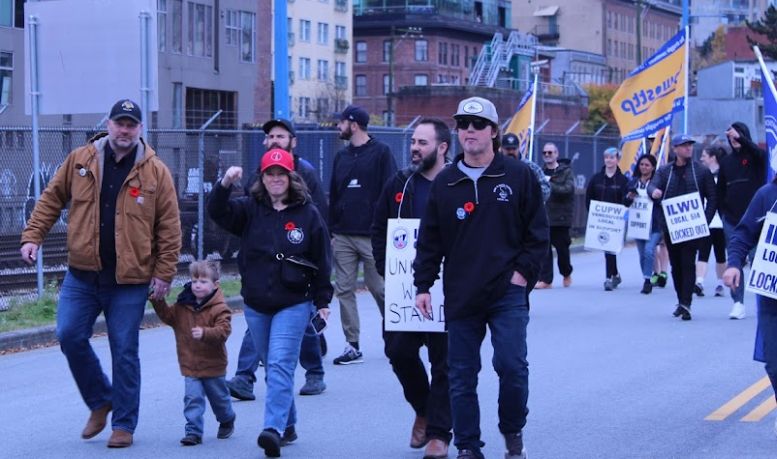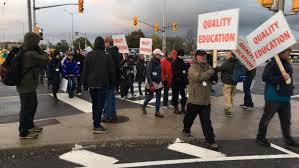Chrystia Freeland’s resignation as Finance Minister is the latest blow to the crumbling Trudeau government. The NDP has stated it will vote “no confidence” in the government. How the government’s demise plays out is being debated now by Liberal MPs, as they face humiliating defeat in the election that is probably only months away.
Unfortunately, for the working class the main beneficiary of collapse of Liberal support is Pierre Poilievre and the Conservatives. The NDP is blamed by many for the Liberals’ unpopular policies and actions after supporting Trudeau for two and half years.
Workers, union members, Indigenous people and environmentalists need to prepare to resist the Tories’ attacks. Governments can and have been defeated by mass movements
Trump’s shocking victory confirms that a smile, nice words and middle-of-the-road policies are no answer to inequality, falling living standards, anger and alienation. Yet increasingly that is all that Trudeau has to offer Canadians.
Pierre Poilievre, the Conservative’s leader, will be Prime Minister, possibly with the biggest parliamentary majority in a decade, some time in the next 12 months. Only a political earthquake will stop this. Tragically, the NDP, rather than providing a strong pro-worker opposition to the Liberals over the last four years, has been a weak tail to the Liberal dog.
Justin Trudeau was elected in 2015 on a wave of “change,” powered especially by young people. During his nine years in government, rents have soared, the Trans Mountain pipeline was bailed out and completed at a cost of $34 billion, and the hope that millions placed in him, after nine years of Stephen Harper, has completely evaporated. Several recent opinion polls show that more young people support the Conservatives than the other parties.
The disappointment with Trudeau is so great that Poilievre, one of Harper’s most reviled cabinet ministers, is now playing to standing room only cheers in halls across the country, while the prime minister sinks deeper into his rut.
Anger at Cost of Living
When Trudeau was elected in 2015, the average monthly rent across Canada’s 35 major centres was $966. In 2023 it was $2,193. Over the same time the average weekly wage increased from $956 to $1,270. Clearly, landlords are making a killing.
It is the same story for groceries and other essentials. Prices have risen far faster than income for workers. Yet when workers strike for higher pay, as they are increasingly forced to do, the media and big business scream about holding the country to ransom.
It is not workers who are ransoming the country — it is the super-rich and corporations. In 2015, Forbes estimated, there were 39 billionaires in Canada with a total wealth of $147 billion. By 2024, there were 67 billionaires in Canada with a total wealth of $315 billion, more than double that of nine years earlier. Corporate profits in 2015 were $759 billion; by 2023 they were $1,238 billion. The growth of profits and billionaires’ wealth comes from the pockets of workers. No wonder people are angry.
Poilievre has No Answers
Poilievre is good at appearing to be angry. His core electoral program is scrapping the carbon tax. It sounds attractive — pay less for gas. However, doing this will mainly help the rich. Most middle- and low-income people receive more in the rebate than they pay in tax. Those with high fuel uses — doing a lot of long-distance driving or with high heating bills — may also benefit.
Poilievre is successfully riding an international wave of anger against the party in government. In BC and Saskatchewan (page 4) the governing parties suffered major setbacks and New Brunswick’s conservatives were booted out of office.
Like many right-wing populists (Trump, Marine LePen in France, etc.), Poilievre is good at appearing to be what he is not. While he echoes the feeling of millions of Canadians struggling to get by and claims to be outside the elite, he has lived the comfortable life of an MP for the last 20 years, since he was 25. He claims to be a friend of working people, and a defender of unions and their right to strike. Yet, while in Harper’s government, he attacked unions’ rights many times and voted to break strikes with back-to-work legislation eight times. He has consistently opposed raising the federal minimum wage to $15.
Also, like other right-wing populists, once elected he will not deliver jobs, but will cut public services and rule Canada for the rich and corporations.
Liberals Also have No Answers
With the election of Trump in the US, Trudeau will campaign on trying to paint Poilievre as Canada’s Trump. Such a campaign will fail just as it failed against Trump or Rustad in BC. The Liberals will be judged and condemned on their record.
Trudeau claimed to tackle climate change, yet Canada is miles off its targets. The carbon tax exemption for heating oil blew a hole in any serious policies as it was a naked grab for future votes in Atlantic Canada. Canada’s export of fossil fuels is increasing, aided by federal subsidies worth at least $18.6 billion in 2023. Every year Canadians experience more climate disasters — fires, heat domes, atmospheric rivers, tropical storms, floods and more — all driven by burning fossil fuels, whether in Canada or around the world. Of course, the Conservatives have even less of a strategy to tackle climate change, relying on the unproven carbon capture technology.
The Liberals now echo the Conservatives’ claim that reducing immigration will make homes more affordable. It will not, as both the Liberals and Conservatives leave housing to the market, which does not build affordable housing. No party will implement what is needed — a plan to build hundreds of thousands of publicly owned and affordable housing units across the country — which Socialist Alternative supports.
Unfortunately, the NDP tied their future to the Liberals when they agreed to support the minority government in 2022. Socialist Alternative warned at the time: “The NDP is playing a dangerous game by trying to work too closely with the Liberal Party.” Their support has flatlined around 20 percent since then.
Productivity Crisis?
Over recent years the business section of Canadian media has been filled with gloom about the slow growth of Canada’s productivity of labour. The reason for the slow growth is the lack of investment by big business, even while making record profits. The profits are going to share buybacks, dividends and huge payouts to the top executives.
Back in 2012, head of the Bank of Canada, Mark Carney, criticized corporations for not investing, instead sitting on piles of “dead money.” A that time non-financial corporations had hoarded $526 billion.
The answer from business writers to slow productivity growth is to cut corporate taxes. Harper cut corporate taxes from 21 percent (already down from 28 percent in 2000) to 15 percent. The result? Canadian firms’ investment per worker declined by 20 percent! The capitalists invest in what is profitable, preferring speculative bubbles and especially housing.
But no doubt, the conservatives will respond to the cries about productivity by cutting corporate taxes. The election of Trump will add to Canada’s instability. Will he impose tariffs on all Canada’s exports to the US? He will push for higher defence spending. All these factors will increase the cuts to much-needed public services and infrastructure investment.
Fighting the Right
Overwhelmingly, Canadians support a wealth tax on the super-rich (around 80 percent), think housing is unaffordable (89 percent) and home ownership is unattainable for most (81 percent), and are worried about climate change (around 75 percent). Hardly the battle cries of right-wing politics.
In Canada and around the world, politics is becoming more polarized and the centre ground, with moderate policies, is collapsing. People are desperate for change; for millions, the present is intolerable. The conservatives are winning because they talk about change.
In the past, the NDP and union leaders knew that to raise workers’ living standards and deliver good public services, the rich had to get less. Now the NDP thinks there is place of compromise between workers and big business.
We cannot rely on the NDP to stop Poilievre. But history is made not only in elections. Most important and positive changes come through organizing and mobilizing. Demonstrations, rallies and strikes make change. These won union rights, the right to vote, pensions, and public health.
The last few years has seen an increase in strikes as workers fight against inflation and greedy bosses. Union members are demanding better pay and conditions. They are rejecting sub-par tentative agreements, telling union leaders to fight for better deals. It is this power that can stop Poilievre’s inevitable attacks on public services, jobs, the environment and human rights.
Union, community, Indigenous and environmental activists should stand united and organized, first to defeat Poilievre, Trump and others and then to end the system, capitalism, which breeds the despair and anger they feed on. The fight against the right should lead to the fight for socialism.




